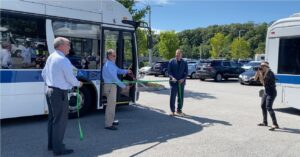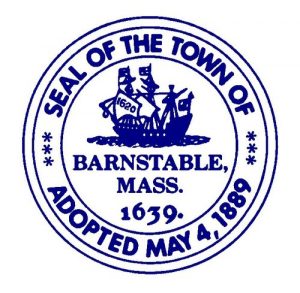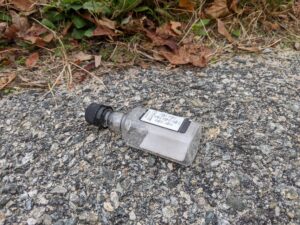
General Manager Robert B. Davis, at left, and BYD USA Regional Sales Manager Randy Premo, at right, hold a ceremonial green ribbon for Steamship Authority Port Council Member Robert S.C. Munier of Falmouth to cut in front of one of the Steamship Authority’s new electric buses in 2023.
HYANNIS – In a bid to help with EV range anxiety, Governor Maura Healey has announced $50 million dollars to build out electric vehicle charging infrastructure across the state.
American Rescue Plan Act funds will bolster the initiative, improving public stations and electrifying the state fleet.
Healey said that the administration should lead by example in addressing climate change, including quickly electrifying the state’s vehicles.
The push for more EVs locally has led the Cape Cod Regional Transit Authority to work with a consultant group to plan out how it can replace its fleet with electric models. That plan could potentially carry an estimated cost of about $79 million dollars.
The Steamship Authority has also received its first three electric buses that will transport customers from off-site parking lots to mainland ferry terminals in Hyannis and Woods Hole.
The move by Healey also follows a recent expansion to the Massachusetts Offers Rebates for Electric Vehicles Program (MOR-EV Program) that adds more rebates on top of the existing $3,500.
The expansion now includes rebates at the point-of-sale with participating dealers, a $3,500 rebate for used EVs for income-qualifying residents, a $1,500 rebate adder for income-qualifying residents called MOR-EV+ that is in addition to the standard rebate for new or used electric vehicles; and increased rebates for certain light-duty pickup trucks.
The full breakdown of how the $50 million will be invested is as follows, according to the statement from the Healey-Driscoll Administration:
Electric Vehicle Curbside Parking for Residents in Multi-Unit Dwellings – $12.5 million
Massachusetts Clean Energy Center (MassCEC) will work to help municipalities expand access to EV charging for residents with limited access to home charging, particularly in environmental justice and urban communities. Pole-mounted and streetlight chargers represent a promising strategy to use existing assets to expand access to curbside charging, but this potential is limited by barriers such as regulatory hurdles, complex ownership structures and unclear business and financial models.
The project aims to increase the number of overnight curbside charging stations, including accessible pole-mounted and streetlamp EV charging solutions. A technical consultant will deploy on-street charging near multi-unit dwelling neighborhoods and provide guidance to municipalities for future implementation.
Medium- and Heavy-Duty Electrification Mobile Charging Solutions – $9.5 million
Medium and Heavy-Duty (MDHD) vehicles make up 3% of Massachusetts vehicles, yet produce 20% of on-road vehicle emissions, making their electrification critical to reaching the state’s climate goals and to improve air quality in environmental justice communities, especially those near warehouses and ports. One major challenge to achieving electrification in this sector is project delays due to limits in grid infrastructure. Mobile charging represents a promising technology that could help fleet operators avoid delays and resist the urge to overbuild through temporary mobile charging solutions. MassCEC will complete a market characterization study paired with deployment projects to demonstrate mobile charging financial models and use cases.
Ride-For-Hire Vehicle Electrification Charging Solutions – $8 million
Uber, Lyft and taxi drivers drive a lot of miles, spend a lot of money on gasoline, and need a lot of charging. MassCEC will deploy EV charging to support the electrification of taxi and transportation network company (TNC) fleets. Electrification of this sector can help support the deployment of electric vehicles in urban areas and environmental justice communities. For example, studies in California show that while TNC drivers make up less than 3% of electric vehicle (EV) drivers, they account for over 40% of all public fast charger use. This project will fund level 2 and fast charging infrastructure projects with a focus on deploying charging resources in environmental justice communities, where a high percentage of TNC drivers reside.
Vehicle-To-Everything (V2X) Analysis and Demonstration Projects – $8 million
The widespread deployment of bidirectional technology would allow EV owners to use their car battery as a resource to reduce home energy costs or sell electricity onto the grid. V2X systems both charge and discharge an EV’s battery, enabling EVs to act as a grid resource by sending energy stored in the onboard battery to the local utility grid or to a grid-connected asset such as a building. This would have the potential transform our relationship with the grid, providing EV drivers with a mobile source of storage and opening up potential revenue streams to support EV adoption for low-income drivers. MassCEC will complete a market characterization analysis and demonstration projects that support vehicle-to-grid and/or vehicle-to-building projects designed to reduce peak demand and provide grid services.
EV Charging at Priority State Facilities – $9.5 million
DCAMM will seek to install fleet EV charging infrastructure in 60 or more high priority sites at state facilities. Each site would receive an average of 4 EV ports and 4 make-ready spots, making it easy to double the number of charging stations in the future.
EV Charging for Other State Vehicles – $1.5 million
DOER will provide funding to other agencies to install fleet EV charging infrastructure at approximately 60 sites, focusing on those not on the high priority list, non-executive branch fleets, and leased facilities.
EV Charging Testing Equipment – $604,000
DOS will purchase EV charging infrastructure testing equipment and hire staff to conduct inspections of public charging stations to ensure that they remain in working order and adhere to a common set of standards.
EV Charging Needs Analysis – $396,000
This funding will support the analytical needs of the EVICC through the end of 2026 to help it continue to assess the current state of EV charging infrastructure and future needs of Massachusetts as it promotes the electrification of the transportation sector.
























